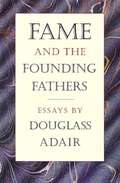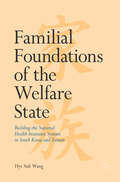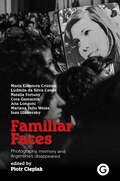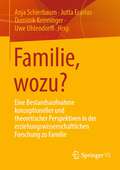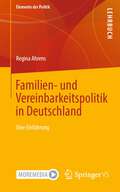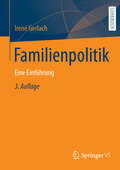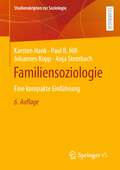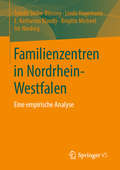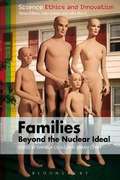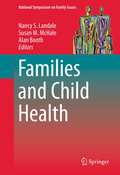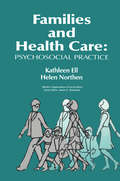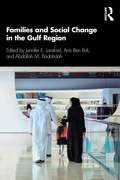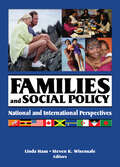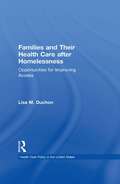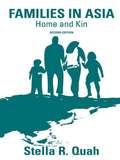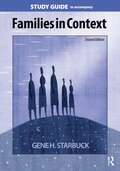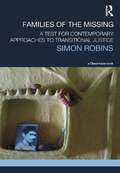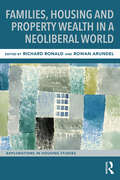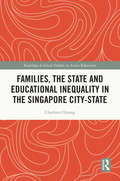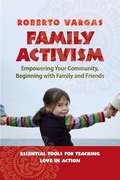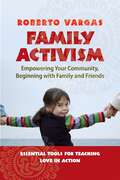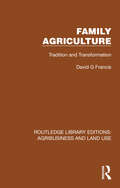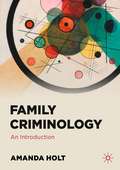- Table View
- List View
Fame and the Founding Fathers: Essays
by Trevor Colbourn Douglass AdairThe fifteen articles, essays, notes and documents gathered in this collection showcase Adair's extraordinary ability to enter emphatically into the experience and ideology of the Founding Fathers while at the same time writing about them critically and movingly.
Familial Foundations of the Welfare State
by Hye Suk WangThis book situates culture as a determining factor in the development of diverse welfare states, exploring the impact of traditional familialism on South Korean and Taiwanese programs. This approach provides an important alternative to studies that focus on formal variables- such as industrialization, state intervention, and resource mobilization- that do not explain the key differences between the similar programs. Throughout this book, Wang looks into both the historical development and the present situation of medical welfare programs in South Korea and Taiwan, and she highlights the importance of families in these programs' development. As East Asian societies continue to age while experiencing fewer births, the search for the most suitable, sustainable, and desirable welfare model in each country will become ever more pressing. Academics and practitioners alike will find this refreshing approach to analysis ideal for building welfare institutions that reflect societal values in addition to economic conditions.
Familiar Faces: Photography, Memory, and Argentina’s Disappeared
by Piotr CieplakAn exploration of the rich and varied relationship between photography and the most recent Argentine dictatorship.Familiar Faces offers a diverse, theoretically rich, and empirically informed exploration of photography in Argentina&’s memorial, political, and artistic landscape. During the country&’s most recent civic-military dictatorship (1976–1983), 30,000 people were disappeared or killed by the state. Over the decades, vernacular and professional photographs have been central to the Argentine struggle for justice. They were used not only to protest the disappearances under the dictatorship and to denounce the authorities, but also as tools of political and social activism, and for remembering the disappeared.With contributions from leading Argentina-based anthropologists, ethnographers, curators, art scholars, media researchers, and photographers, Familiar Faces moves beyond the traditional considerations of representation, focusing instead on the ways in which photography is continuously reimagined as a tool of memory, mourning, and political and judicial activism. In so doing, it considers the diverse uses of press photography; artistic practice; photographs of the disappeared in domestic rituals; photographs of the inmates of torture centers; the reclamation of images taken by the dictatorial state for memorial and activist purposes. Written and published at a crucial moment in Argentine memory politics, Familiar Faces offers a geographically and formally diverse selection of case studies, with international as well as regional resonance. While firmly rooted in this national context, the book contributes to wider, global debates about the increasingly pervasive role of the photographic image in relation to state-sponsored, large-scale violence.
Familie, wozu?: Eine Bestandsaufnahme konzeptioneller und theoretischer Perspektiven in der erziehungswissenschaftlichen Forschung zu Familie
by Jutta Ecarius Anja Schierbaum Dominik Krinninger Uwe UhlendorffDas Buch fragt: Familie wozu? und dokumentiert konzeptionelle und theoretische Perspektiven, Entwicklungen und Kontroversen in der erziehungswissenschaftlichen Forschung zu Familie. Mit der Frage Familie – wozu? werden gezielt Themen zu Familie und Gesellschaft, Familienbeziehungen und -konstellationen, privater und öffentlicher Erziehung und Bildung aufgegriffen und diese aus spezifischen erziehungswissenschaftlichen Perspektiven diskutiert.
Familien- und Vereinbarkeitspolitik in Deutschland: Eine Einführung (Elemente der Politik)
by Regina AhrensDieses Lehrbuch gibt einen fundierten Einblick in das Politikfeld Familienpolitik. Es zeichnet die historischen Entwicklungen in Deutschland nach und zeigt politikfeldanalytische Erklärungen auf. Das Lehrbuch ermöglicht damit auch ein Verständnis der aktuellen familienpolitischen Diskurse. Es richtet sich vornehmlich an Studierende im Bachelor und Master, aber auch an Praktikerinnen und Praktiker, die sich aufgrund von neuen beruflichen Aufgaben in die Grundzüge der Familienpolitik in Deutschland einlesen möchten. Das Buch enthält ergänzendes Online-Material.
Familienpolitik: Eine Einführung
by Irene GerlachDie Bedeutung von Familienpolitik hat sich auf allen Ebenen des politischen Systems in Deutschland in den letzten Jahrzehnten erheblich geändert – sie ist von einem eher randständigen zu einem zentralen Politikfeld geworden und hat dabei weitgehend die vormals charakterisierende ethisch-moralische Lagerbildung überwunden. Dabei wurde immer deutlicher, welch zentrale Rolle Familien für die Gegenwart und Zukunft unserer Gesellschaft haben, aber auch, wie sehr sie der Unterstützung durch eine gute und verlässliche Familienpolitik bedürfen. Das Buch, das für diese dritte Auflage grundlegend aktualisiert und erweitert wurde, versteht sich als umfassende und systematische Einführung in die Entwicklung, die Konzeption und die Handlungsfelder der Familienpolitik sowie als Grundlage zu einer normativen Neubewertung ihrer Funktionen. Dabei bemüht es sich um eine interdisziplinäre Analyse aus politikwissenschaftlicher, soziologischer, rechtlicher und ökonomischer Perspektive. Daneben wird der familienpolitische Prozess von der Gründung des Familienministeriums bis zur 19. Legislaturperiode differenziert beschrieben. Dabei zeigt sich einerseits die immer ausgeprägtere Systematik des familienpolitischen Instrumentariums, andererseits gibt es aber auch immer wieder Einschränkungen der politischen Wirksamkeit durch Rückfälle in dominant parteipolitische Prägungen der Politik.
Familiensoziologie: Eine kompakte Einführung (Studienskripten zur Soziologie)
by Johannes Kopp Karsten Hank Paul B. Hill Anja SteinbachDer Band gibt einen fundierten Einblick in die Familiensoziologie. Dabei werden zunächst die historischen und ethnologischen Variationen der Formen familialen Lebens thematisiert und die wichtigsten Theorietraditionen der Familiensoziologie vorgestellt. Für die zentralen Gegenstandsbereiche - etwa Partnerwahl, Heiratsverhalten, innerfamiliale Interaktion, Fertilität, Familienformen sowie Trennung und Scheidung - wird der theoretische und empirische Stand der Forschung vorgestellt und diskutiert.
Familienzentren in Nordrhein-Westfalen: Eine empirische Analyse
by Sybille Stöbe-Blossey Linda Hagemann E. Katharina Klaudy Brigitte Micheel Iris NiedingFamilienzentren sind Kindertageseinrichtungen, die in Kooperation mit unterschiedlichen Partnern ein breites und niederschwelliges Angebot für die Beratung, Unterstützung und Bildung von Familien im Sozialraum bereithalten. In Nordrhein-Westfalen wird seit 2006 im Rahmen eines Landesprogramms mehr als ein Drittel der Kindertageseinrichtungen zu Familienzentren weiterentwickelt. Das Buch enthält die Ergebnisse einer empirischen Studie und zeigt, wie Familienzentren die erweiterte Familien-, Kooperations- und Sozialraumorientierung in der Praxis umsetzen.
Families - Beyond The Nuclear Ideal
by Sarah Chan Daniela CutasThis book examines, through a multi-disciplinary lens, the possibilities offered by relationships and family forms that challenge the nuclear family ideal, and some of the arguments that recommend or disqualify these as legitimate units in our societies. That children should be conceived naturally, born to and raised by their two young, heterosexual, married to each other, genetic parents; that this relationship between parents is also the ideal relationship between romantic or sexual partners; and that romance and sexual intimacy ought to be at the core of our closest personal relationships - all these elements converge towards the ideal of the nuclear family. The authors consider a range of relationship and family structures that depart from this ideal: polyamory and polygamy, single and polyparenting, parenting by gay and lesbian couples, as well as families created through assisted human reproduction.
Families and Child Health
by Alan Booth Nancy S Landale Susan M MchaleIn recent years, there has been an explosion of research on the early origins of adult health. A growing body of evidence documents that maternal health before conception, prenatal and perinatal exposures, and conditions in childhood play critical roles in health over the life course. Scientific understanding of the multiple and interacting influences on child health and their role in later health continues to evolve rapidly, but greater attention to how families shape the conditions of early life that underlie childhood health is needed. This volume aims to advance understanding of this topic, with attention to mechanisms through which health disparities emerge and are sustained across the lifespan.
Families and Health Care: Psychosocial Practice (Modern Applications Of Social Work Ser.)
by Kathleen EllFirst Published in 2018. Routledge is an imprint of Taylor & Francis, an Informa company.
Families and Social Change in the Gulf Region
by Jennifer E. Lansford Anis Ben Brik Abdallah M. BadahdahThis timely volume explores the impact of dramatic social change that has disrupted established patterns of family life and human development in the countries of the Gulf Cooperation Council. It addresses several major deficits in knowledge regarding family issues in the Gulf countries, bringing a critical perspective to the emerging challenges facing families in this region. Lansford, Ben Brik, and Badahdah examine the role of urbanization, educational progress, emigration, globalization, and changes in the status of women on social change, as well as tackling issues related to marriage, fertility and parenthood, and family well-being. This book explores how family relationships and social policies can promote physical health, psychological well-being, social relationships, safety, cognitive development, and economic security in the Gulf countries, placing a unique emphasis on contemporary families in this region. Families and Social Change in the Gulf Region is essential reading for scholars from psychology, sociology, education, law, and public policy. It will also be of interest to graduate students in these disciplines.
Families and Social Policy: National and International Perspectives
by Steven K. Wisensale Linda HaasEmpirical research that describes ways to best handle social problems concerning familiesLeading authorities&’ studies show that from the effects of globalization many social and family problems and their solutions tend to be similar in nations world-wide. Families and Social Policy: National and International Perspectives explores
Families and Their Health Care after Homelessness: Opportunities for Improving Access (Health Care Policy in the United States)
by Lisa M. DuchonFirst published in 1999. Routledge is an imprint of Taylor & Francis, an informa company.
Families in Asia: Home and Kin
by Stella QuahFamilies in Asia provides a unique sociological analysis of family trends in Asia. Stella R. Quah uses demographic and survey data, personal interviews and case studies from China, Hong Kong, Japan, South Korea, Indonesia, Malaysia, the Philippines, Singapore, Thailand and Vietnam to provide a wide-ranging comparative analysis of family trends and the role of the state and social policy. Focusing on the most relevant and significant aspects of family and kin, chapters include: Concepts and research trends Family forming Parenthood Grandparenthood Gender roles in families Marriage breakdown The impact of Socio-economic development This new edition has been updated and expanded throughout and includes new material on dowry, singlehood, adoption, the transformation of the senior generation, changes in family courts and the role of the state in family wellbeing. Families in Asia will be the perfect companion for students and scholars alike who are interested in family sociology, public and social policy, and Asian society and culture more broadly.
Families in Context Study Guide
by Gene H. StarbuckThis Study Guide is designed to help students review and apply the material presented in the textbook, "Families in Context." Many of the sample questions were originally prepared by Wanda Clark for the first edition of the textbook. The organization of this study guide corresponds to chapters in "Families in Context."To learn more about the "Families in Context" main text, please visit the bookpage here: Families In Context, Second Edition, Revised & Updated
Families in Focus: New Perspectives on Mothers, Fathers, and Children
by Judith Bruce Cynthia Lloyd Ann LeonardThis Population Council Report shows that, in rich and poor countries alike, parent-child bonds are unraveling and that women carry much more significant economic and social responsibilities for the family than commonly believed. The authors of this book urge policymakers and researchers to focus on strengthening parent-child ties and to look beyond the myth that all families are stable and cohesive units in which the father serves as economic provider, the mother serves as emotional caregiver, and all children are treated equally well.
Families of the Missing: A Test for Contemporary Approaches to Transitional Justice
by Simon RobinsFamilies of the Missing interrogates the current practice of transitional justice from the viewpoint of the families of those disappeared and missing as a result of conflict and political violence. Studying the needs of families of the missing in two contexts, Nepal and Timor-Leste, the practice of transitional justice is seen to be rooted in discourses that are alien to predominantly poor and rural victims of violence, and that are driven by elites with agendas that diverge from those of the victims. In contrast to the legalist orientation of the global transitional justice project, victims do not see judicial process as a priority. Rather, they urgently seek an answer concerning the fate of the missing, and to retrieve human remains. As important are livelihood issues where families are struggling to cope with the loss of breadwinners and seek support to ensure economic security. Although rights are the product of a discourse that claims to be global and universal, needs are necessarily local and particular, the product of culture and context. And it is from this perspective that this volume seeks both to understand the limitations of transitional justice processes in addressing the priorities of victims, and to provide the basis of an emancipatory victim-centred approach to transitional justice.
Families, Housing and Property Wealth in a Neoliberal World (Explorations in Housing Studies)
by Richard Ronald Rowan ArundelThe twenty-first century has so far been characterized by ongoing realignments in the organization of the economy around housing and real estate. Markets have boomed and bust and boomed again with residential property increasingly a focus of wealth accumulation practices. While analyses have largely focussed on global flows of capital and large institutions, families have served as critical actors. Housing properties are family goods that shape how members interact, organise themselves, and deal with the vicissitudes of everyday economic life. Families have, moreover, increasingly mobilized around their homes as assets, aligning household transitions and practices towards the accumulation of property wealth. The capacities of different families to realise this, however, are highly uneven with housing conditions becoming increasingly central to growing inequalities and processes of social stratification. This book addresses changing relationships between families and their homes over the latest period of neo-liberalization. The book confronts how transformations in households, life-course transitions, kinship and intergenerational relations shape, and are being shaped by, the shifting role of property markets in social and economic processes. The chapters explore this in terms of different aspects of home, family life and socioeconomic change across varied national contexts.
Families, the State and Educational Inequality in the Singapore City-State (Routledge Critical Studies in Asian Education)
by Charleen ChiongFocusing on Singapore’s education system from an equity perspective, Chiong’s book describes the often unheard perspectives of socio-economically disadvantaged families in Singapore. The performance of Singaporean students on international education benchmarking tests has been widely recognised. Relatively less known is how socio-economically disadvantaged families negotiate Singapore’s highly competitive, stratifying and meritocratic system. Yet, families’ perspectives can provide crucial insight in understanding how policy is ‘lived’ and experienced, and its effects on people’s lives. Drawing on 72 interviews with 12 families, this book traces the development of surprisingly close, collaborative relations between the state, schools and families on Singapore’s socio-economic margins. It demonstrates that in the 'strong' state of Singapore, families’ dependency on schools and the state facilitates the internalisation of individual and familial responsibility for future success. However, these very processes can injure, and perpetuate inequality. The analysis presented in this book has relevance in other contexts, in times where advanced capitalist states face growing inequalities and challenging relationships between institutional authority and the wider populace. As socio-economic and educational inequalities widen, this book asks timely questions and provides recommendations on what a more equitable state-citizen compact might look like. The book will appeal to researchers and students who are interested in the fields of the sociology and politics of education, social policy, and Asian culture and society.
Family Activism: Empowering Your Community, Beginning with Family and Friends
by Roberto VargasWe tend to focus on trying to solve big societal problems, the big barriers that separate us, but, as Roberto Vargas argues, the most promising path to change is actually the most accessible and the most universal: the family.
Family Activism: Empowering Your Community, Beginning with Family and Friends
by Roberto VargasWe live in a world that needs radical transformation if our children and grandchildren are to live healthy, peace-filled lives. But where to start? In this inspiring new book, activist Roberto Vargas says the answer lies surprisingly close: at home, with our closest relationships. In our daily lives we experience countless opportunities to empower, inspire, and support positive change in those around us. In Family Activism Vargas explains how fostering what he calls familia—close, loving connections with our relatives and with those we choose to call family—can help us develop the skills and attitudes we need to tackle broader problems in our community, our nation, and the world. Vargas explains the ideas underlying the familia approach and the techniques that support it using examples from his own life, some of them very emotionally charged. He does more than just describe practices like the family council, unity circles, and family ceremonies—he shares how they transformed him as a husband, father, son, brother, friend, and as a committed community activist. Each chapter ends with a series of questions that will help readers understand these practices more deeply and apply them inside and outside of the family.
Family Agriculture: Tradition and Transformation (Routledge Library Editions: Agribusiness and Land Use #9)
by David G. FrancisOriginally published in 1994, this book examines the importance of family agricultural systems in both the developed and the developing worlds. Throughout the world, and throughout history, the family unit has been at the heart of agricultural systems. Working together, families not only furnish their own needs, but form the basis for society itself: they provide the labour, population, resources and the market to maintain much of the world’s economic and social development. But the global race for financial prosperity, with its large-scale intensive farming techniques, is increasingly undermining the family’s role in food production and social cohesion. This book explores both traditional and modern farming techniques and looks at their different consequences for national agricultural resources and for rural societies. Finally, it suggests ways in which technology can be harnessed to meet the needs of the family rather than undermine it, in order to achieve a viable and sustainable agriculture for the future.
Family Circle
by Susan BraudyIn 1970, Kathy Boudin, revolutionary Weatherman, fled the ruins of a town house on West Eleventh Street in Greenwich Village after a bomb that was being made there exploded, killing three people, and America's sympathy with radicalism fell apart. The Weathermen had started as angry kids who planted stink bombs and emulated the Black Panthers, but the bomb they were building on Eleventh Street was deadly. Kathy, daughter of the celebrated lawyer Leonard Boudin, third generation of the famous Boudin family, emerged naked from the wreckage, was given some clothes by a neighbor, slipped into the night, and went underground for the next eleven years, her name soon appearing on the FBI's 10 Most Wanted List.Susan Braudy tells the riveting story of the Boudin family circle through four generations. She writes of Kathy Boudin's childhood, growing up in Manhattan in an ambitious, liberal New York Jewish family, daughter of a revered left-wing labor and civil liberties lawyer and an intellectual poet mother. Braudy writes of Kathy's parents; her father, Leonard, who patterned his life after that of his uncle, the great labor lawyer and leftist legal scholar, Louis B. Boudin (in the 1930s he fought in court for new laws to protect and organize labor unions and was one of the foremost translators and interpreters of Karl Marx). Leonard Boudin fought on behalf of dissenters on the left. He argued the cases of Paul Robeson and the two-time convicted spy Judith Coplon before the Supreme Court, forcing the U.S. government to allow free travel to all citizens and preventing the admission of illegally gathered evidence, rulings that crucially curtailed the power of J. Edgar Hoover. Braudy writes of Boudin's legal work on behalf of such clients as Rockwell Kent and Julian Bond; his defense of Fidel Castro in connection with his seizure of American capital in Cuba; his case on behalf of Dr. Benjamin Spock (arrested for protesting the Vietnam War; Boudin put the war, not Dr. Spock, on trial); and his case on behalf of Daniel Ellsberg, helping him to leak the Pentagon Papers, which set the stage for Nixon's resignation. We see Kathy's mother, Jean Boudin, poet and intellectual, an orphan taken in by a cultivated Jewish family whose circle included Marc Blitzstein and Clifford Odets; her courtship and marriage to Leonard (they were toasted as "the most gorgeous couple of the left"); her years as the dutiful, devoted wife to a husband who conducted countless affairs; her suicide attempt when Kathy was nine. And we see Leonard's lifelong mentor and competitor--his brother-in-law, the brilliant, scrappy independent journalist and government critic I. F. Stone, a born leader and fighter who made war on government bureaucrats (believing they usurped power) and on his deadly enemy, J. Edgar Hoover.We follow Kathy at Bryn Mawr, organizing the school's maids to demand fair wages, graduating magna cum laude in the top five of her class; failing to get into Yale Law School (while her brother was a star at Harvard); helping to plan the riots at the 1968 Democratic convention in Chicago and the "Days of Rage" that followed; breaking Black Panther Assata Shakur out of jail; bombing the headquarters of the Manhattan Police Department and the Capitol in Washington; and finally, in 1981, being part of the botched robbery of a Brinks truck that turned into a bloodbath (two policemen and one Brinks guard were killed), which resulted in her trial with her father as her lawyer; her years in Bedford Hills prison as a model prisoner, teacher, and AIDS activist--and her release after twenty-two years.A huge, rich, riveting book--a story of idealism and passion; of law and brilliant legal minds; of political intrigue and government witch-hunts; of SDS and the Days of Rage; of Vietnam protests and underground revolutionary terrorism; and of the golden family at the center of this vortex, who came to be seen through five decades as the very emblem of the American left.
Family Criminology: An Introduction
by Amanda HoltThis full-colour textbook offers a fresh conceptual approach to understanding the intersections of crime, criminal justice and family life. In doing so, it proposes a brand new sub-discipline of Criminology that places the family at the heart of its analysis, offering a groundbreaking approach to the study of crime and deviance. Adopting an interdisciplinary perspective, this introductory text explores topics from across the spectrum of criminological scholarship, including youth justice, prisons, organized crime, family violence and homicide, and victimology. By drawing together these distinct topics and identifying and discussing their familial connections, this book argues for the importance of family life in the theory and practice of crime and justice. Key questions discussed throughout the text include: How does the criminal justice system engage with families across different contexts? In what ways do crime and criminal justice processes impact on family life? In what ways can families transform the criminal justice system for the betterment of all? This book challenges commonly-held and simplistic assumptions about what the family is in relation to crime and justice and, by doing so, engages in deeper debates about human rights, social justice and the role of the state in relation to families and crime. It includes pedagogic features including conceptual toolboxes, questions for reflection, textboxes, a glossary and interviews with practitioners.
